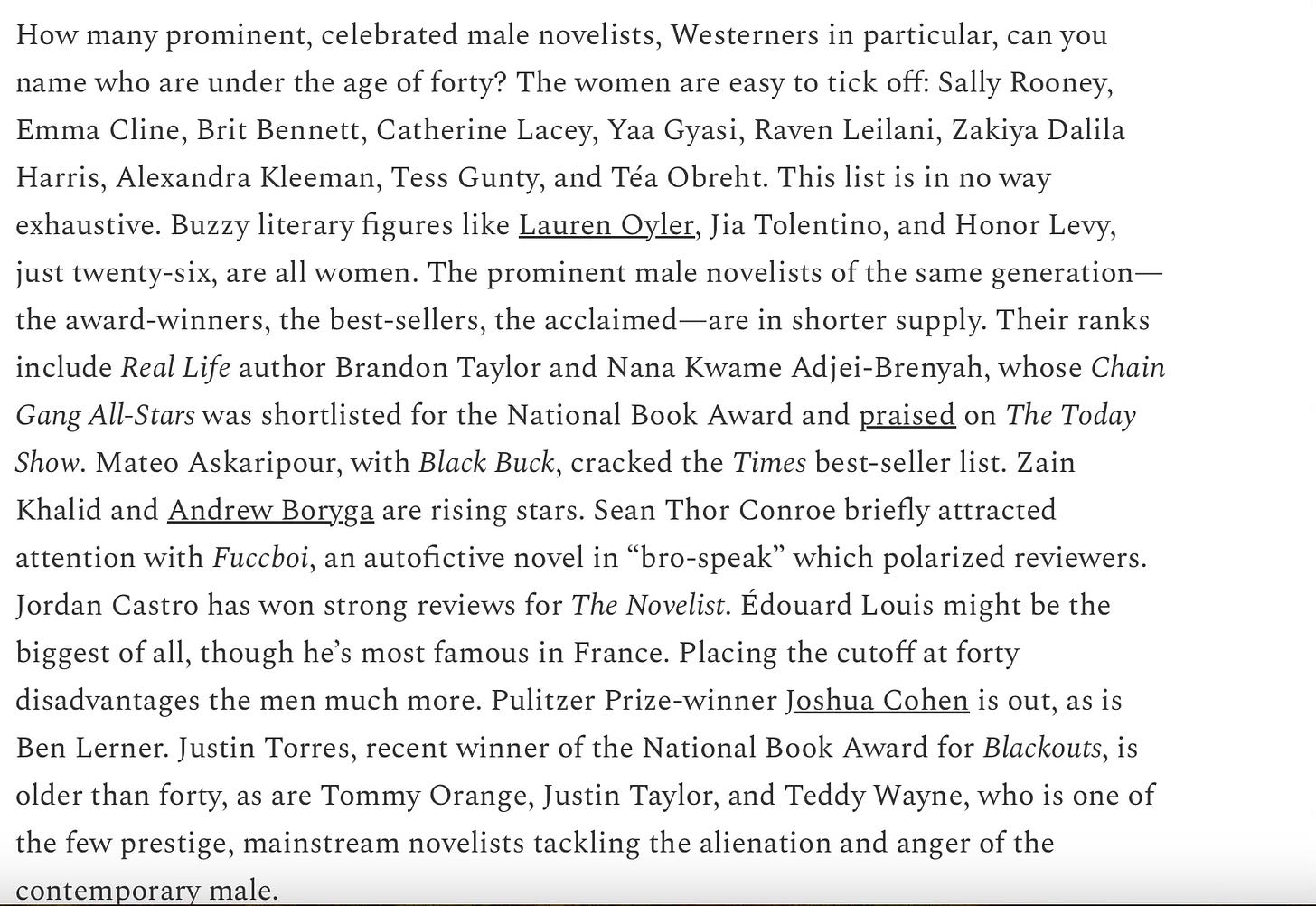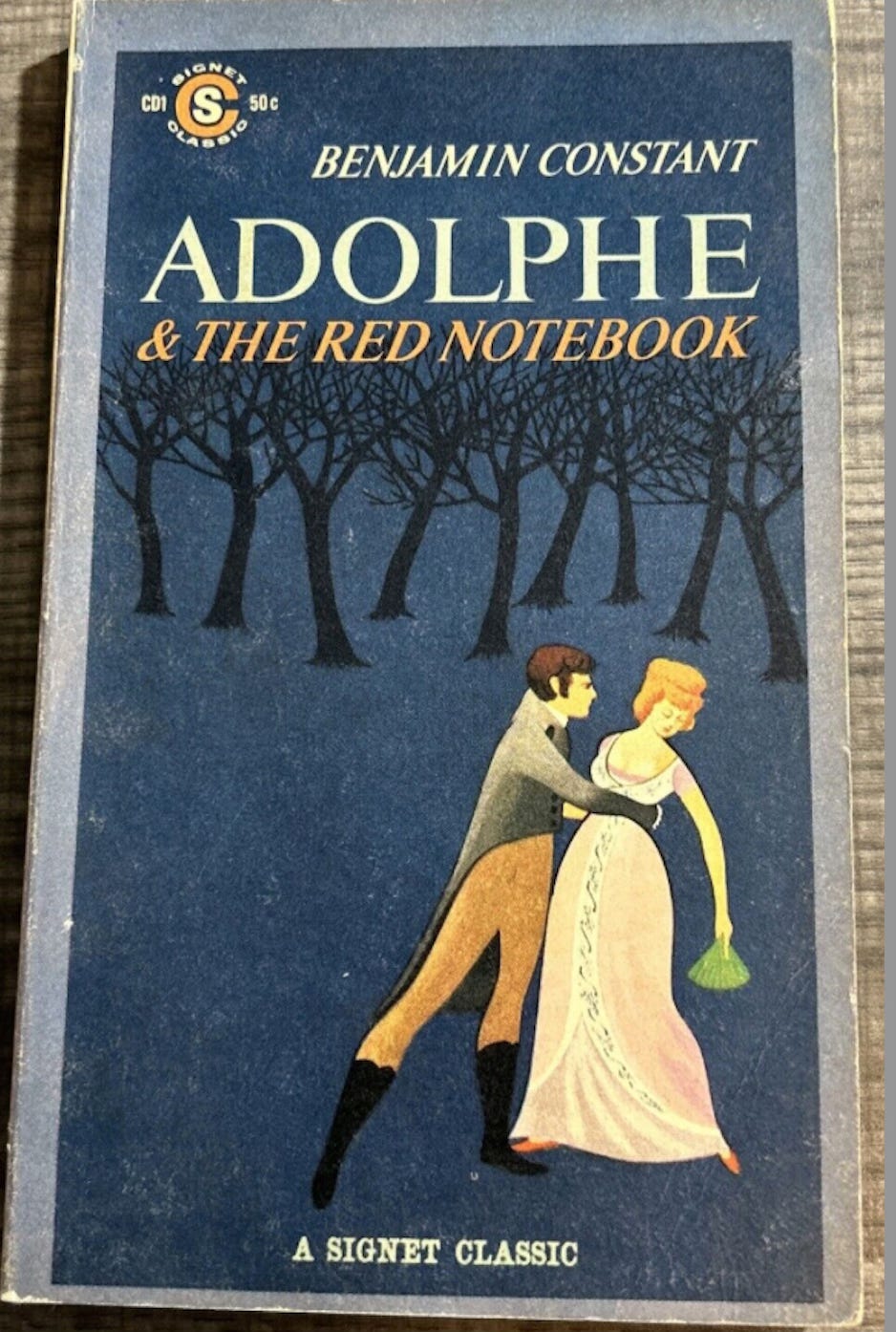Where To Find Intellectual Life
How too many women led me to so many men. Also, what I've been reading
I’ve been following a loose network of writing about publishing, books, and literature for awhile now. Places like Bookriot, Lithub, NYT books coverage, The Millions, LARB, and related coverage in places like The New Republic and The Nation, and newsletters. These outlets and people often respond to the same publishing/literary news of the day, all covered by each other. I’ve been keeping myself in place, reading too much about too few topics.
So I started traveling elsewhere, and found myself eavesdropping on startling conversations that have been going all the while, without me (the nerve). It’s not new to me that readers of romance and genre, and their related self-publishing worlds, have been having their own conversations, but I did not realize there are so many writers and critics who deem just about all traditional publishing a diluted industry, and writing about this from an entirely different stance.
For instance, there is a lot of talk about the plight of the white male. This is so very easy to dismiss and pillory, but things happen if you sit still and keep reading. For instance, Ross Barkan writes, in “From Misogyny to No Man’s Land””
Continue, if you would, reading ARX-HAN of Decentralized Fiction and the recently self-published novel INCEL, discussing the paucity of books published today that “accurately capture the psyche of millennial masculinity:”
Elsewhere, I am overhearing lots of discussions of how English departments, like publishing, have become feminized (ouch x2).
More clicks led me to this conversation between John Pistelli and
about Wesley Yang, discussing some of the above issues, as well as the ills of identity politics, neocons and the overreach of ‘woke’. At about the 35 minute mark, John and Dan start discussing where the intellectual energy that used to reside in the humanities academy circa 1990s and earlier has gone, now that so many are unable to get academic (or journalism, or library, or….) jobs. It’s a very good question (and my secret quest is to sign as many people with precisely this energy up for books with Belt Publishing as I can). I wanted to yell “Twitter in the 2010s!” as that’s where I found an intellectual community when I, even though I did have one of those magical tenured position, finally found a community I had sought but was unable to find in my day job. People often ask me why I left academia and an answer I could but never give is “because I was having so many much more interesting conversations on Twitter.”I am thinking hard right now about what I’m reading. I’m happy to find very interesting conversations by smart and knowledgable and talented writers on topics I care deeply about and are unlike the same old conversations. If I sometimes go “whoa WTF” I also continue clicking until I humble myself by how constrained has been my critical diet. This is healthy! It is never not wise to read smart people discussing topics you care about sincerely and passionately.
I have also learned about new writing communities that deem just about any traditional press, small or indie or conglomerate, as “mainstream,” and is increasingly comfortable and proud to self-publish. I am heartily cheered by this as well. Good for them. More writers who could get traditional contracts should self-publish, and the more that do, the more pressure there will be on agents, editors, and presses to take more risks, and stop catering to one known market over and over again. And another thing: readers already know this, and have already found them. A sizeable group that may have previously but have now dispensed with needing a colophon to assure quality before purchasing buys, reads, and reviews self-published books that are more high than lowbrow (which I state as there is an assumed correlation between self- and low- that is increasingly erroneous). Reliable, convincing data won’t ever be handy, but there are enough readers to sustain a discrete community of writers and readers, which is, actually, what traditional publishing houses could/should be convening, catering, and working to expand.
During that interview with Pistelli and Oppenheimer, they wondered if Substack might be where the intellectual energy has gone, particularly from the academic diaspora. Is that the case? Is Substack the new Twitter of the 2010s? (what a ridiculous sentence/question). Send me more links! Keep me clicking.
On my nightstand, lots of re-reading (I grow old?): I binged E. M. Forster and hear it here first: he’s very good! Howard’s End devastated me in all the right ways. Passage To India I was less overwhelmed by, but maybe because I loved it so much in my 20s. That said, it holds up, which, given the topic, is impressive enough. I also started Washington Square which I found both stressful and tedious, a terrible combination. I read the latest Keven Kwan which I enjoyed but suspect he is capable of being twice as good without much effort and hope he tries that sometime (maybe he should self-publish). Then I started How Not To Kill Yourself by Clancy Martin, which had some anecdotes about Wittgenstein in the opening chapters, which led me to away to House of Wittgenstein by Alexander Waugh which is great. (We need more books like this—witty, non doorstop-y, unconventional biographies). Also the Julian Barnes I wrote about last week and another minor2 Muriel Spark (Aiding and Abetting)3
I haven’t returned to the Clancy Martin yet because I got distracted by seeing him in the New York Times with this cynical project. I am not as knee-jerk anti AI as many others, but this is gross. Also, there are so many wandering non-academics with PhDs who would be happy to become itinerant tutors of bored rich people who want to talk about Heidegger! We could build this up into a whole (human intelligence) thing. Like a WPA for intellectual life.
And now—I’m taking a vacation next week—a much needed one, and the first in a very, very, very, very long time. I’ll be back here in two weeks. Might you miss me? Might that be a sign that you should become a paid subscriber? If you do so by the end of June it’ll only cost you $20 for one year. That’s less than the extra fees on just one DoorDash delivery.
Apropos of nothing in this newsletter, but for one coming soon: the very first Signet Classic! Suggested by Andre Schiffren.
Minor= laudatory
It would be tempting to say “Anne! All those dudes!” given the rest of this newsletter but what I am struck by is not gender but my increasing Anglophilia. I don’t know why this is! I don’t like it! But I also almost always choose it! This goes for tv and movies as well!





Maybe I’m old enough to remember the 80s as a cultural wasteland, which I now view fondly under the cloud of nostalgia, and that there was nothing worth reading then. But it turns out that time sifts all that into a sort of intellectual recycling conveyor belt, leaving the survivors as work worth engaging with, reading, listening, viewing. Maybe the there is really nothing for any under 40 write to really say when they emerge from an infantilized cocoon with the expectation that experience is a reaction to screens instead of the real world. Then there is Starburster by Fontaines DC. Sure, it’s a band with a song. But they sure do have something to say.
WPA for intellectual life! I am in! I find that adults (as in people well past traditional college age) are so much more enthusiastic as students than, well, you know, traditional college students. They hunger for intellectual conversations because those conversations are so few and far between in our society. In fact, I've started a sort of salon with a group of friends where we get together and discuss "intellectual" topics, like, what is art?
Enjoy your break!